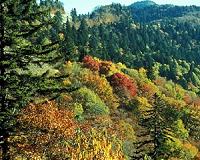| . |  |
. |
Geneva (AFP) April 20, 2011 Swiss officials began moving trout from a river this week to save them from plunging water levels, amid one of the worst droughts to hit the country in 150 years. "2011 is off to a good start to finish as one of the most significant droughts since 1864," the year when records began in Switzerland, said Olivier Duding, a climatologist from Swiss weather service Meteosuisse. Across Switzerland, rainfall measured from January to date is half that of previous years' average. Eastern Switzerland's ski resort of Sils-Maria has recorded the beginning of 2011 as the driest since records began. In canton Zurich, officials began moving trout this week from the river Toess before their habitat dried up. Meanwhile, cracked mud line the shores of western Switzerland's Lake Gruyere where water levels have also plunged. According to Meteosuisse, the drought in western Switzerland over the last 12 months is as severe as those recorded in 1884 and 1921. Several cantons have also imposed bans on lighting fire in and close to forests. "It is very dry in Switzerland, there has been a snow shortage, a water shortage through winter," said Urs Vogt, who manages Suckler Cow Switzerland, an association which champions keeping calves with their mothers after birth. Vogt warned that once the cows have fed on this spring's first greens, there may be little left for coming months, as "there is little growth in the prairies." Farmers may have to turn to alternatives, such as hay, dried grass or corn silage, to feed their cattle, said Andreas Muenger, a scientist at the Federal Office for Agriculture's research body Agroscope. The impact of the current drought will stretch through next winter. Muenger explained that usually, "at this point of the year, there is too much grass," allowing farmers to "make hay for the winter." The grass shortage therefore could lead to a fodder shortfall for next winter. Nevertheless, Muenger said the situation has not reached disastrous proportions. During a severe heatwave of 2003, the meadows were scorched and Swiss farmers were forced to import grass from abroad. Farmers are now hoping for rain, which is expected next week. However, Duding said that Switzerland would need more than just next week's few milimetres to end the drought. What would be necessary, he said, is 100 to 200 milimetres of rain over several days to wash away the drought. "Ideally three to four days of good rain," he added.
Share This Article With Planet Earth
Related Links Climate Science News - Modeling, Mitigation Adaptation
 Carbon Sequestration Estimate In U.S. Increased - Barring A Drought
Carbon Sequestration Estimate In U.S. Increased - Barring A DroughtCorvallis OR (SPX) Apr 15, 2011 A research group has concluded that forests and other terrestrial ecosystems in the lower 48 states can sequester up to 40 percent of the nation's fossil fuel carbon emissions, a larger amount than previously estimated - unless a drought or other major disturbance occurs. Widespread droughts, such as those that occurred in 2002 and 2006, can cut the amount of carbon sequestered by about 20 ... read more |
|
| The content herein, unless otherwise known to be public domain, are Copyright 1995-2010 - SpaceDaily. AFP and UPI Wire Stories are copyright Agence France-Presse and United Press International. ESA Portal Reports are copyright European Space Agency. All NASA sourced material is public domain. Additional copyrights may apply in whole or part to other bona fide parties. Advertising does not imply endorsement,agreement or approval of any opinions, statements or information provided by SpaceDaily on any Web page published or hosted by SpaceDaily. Privacy Statement |